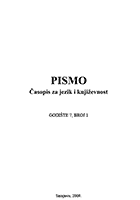Kontrastivna analiza infinitivne fraze u pridjevskoj komplementaciji u engleskom i bosanskom jeziku
A Contrastive Analysis of the Infinitive Phrase in Adjectival Complementation in English and Bosnian
Author(s): Izela Habul-ŠabanovićSubject(s): Language and Literature Studies
Published by: Bosansko filološko društvo
Keywords: infinitiv; infinitivna fraza; klauza; pridjevski komplement; pridjevska komplementacija; finitna konstrukcija; ekstrapozicija;‘Tough- Movement’; predikativna konstrukcija; prijedložno-padežna konstrukcija
Summary/Abstract: English and Bosnian mostly differ with respect to the complementation of adjectives with the infinitive phrase. Namely, the infinitive phrase used in adjectival complementation has more frequent and wider usage in English than in Bosnian. Therefore, we aimed at providing a systematic classification of the most common translation equivalents in Bosnian of the English infinitive phrase in adjectival complementation, especially in all those cases where correspondence could not be established. We used the model of adjectival complementation with the infinitive phrase offered by the authors Quirk et al. (1985: 1226-1230) and we based our research on the corpus gathered from several novels, journals and newspapers. Our contrastive analysis has shown that the similarities between English and Bosnian occur only with a restricted group of adjectives, with specific semantic orientation which corresponds to similar meanings of some modal verbs (e.g. He is ready to do the task = On je spreman uraditi / da uradi taj zadatak). The basic precondition is the equality of subjects both in the main clause and the infinitive phrase. In most other cases, the English infinitive phrase used in adjectival complementation is translated into Bosnian as a finite construction introduced by the complementizer da, a relative clause used attributively or a special construction including a preposition and a case marked noun (e.g. za + accusative N to express purpose). When the English infinitive phrase is used as a condensed version of a relative clause with modal meaning, in the translation in Bosnian we almost systematically encounter a relative clause as well, containing the appropriate modal verb encoding the similar meaning.
Journal: Pismo - Časopis za jezik i književnost
- Issue Year: 2009
- Issue No: 07
- Page Range: 61-79
- Page Count: 19
- Language: Bosnian

